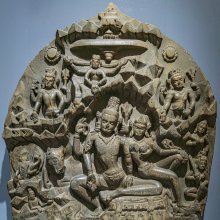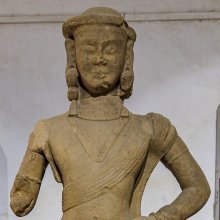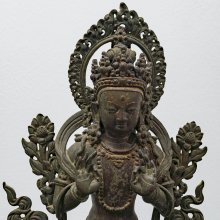Licchavi, Licchavī: 7 definitions
Introduction:
Licchavi means something in Buddhism, Pali, Hinduism, Sanskrit, the history of ancient India. If you want to know the exact meaning, history, etymology or English translation of this term then check out the descriptions on this page. Add your comment or reference to a book if you want to contribute to this summary article.
Alternative spellings of this word include Lichchhavi.
Images (photo gallery)
(+39 more images available)
In Buddhism
Theravada (major branch of Buddhism)
Source: Pali Kanon: Pali Proper NamesA powerful tribe of India in the time of the Buddha. They were certainly khattiyas, for on that ground they claimed a share of the Buddhas relics. D.ii.165; according to the Mtu.i.283, etc., they belonged to the Vasistha gotta; cp. the Mallas (q.v.), who are called Vasetthas.
Their capital was Vesali, and they formed a part of the Vajjian confederacy, being often referred to as the Vajjis (q.v.). Their strength lay in their great unity; if one Licchavi fell ill, all the others would visit him. The whole tribe would join in any ceremony performed in the house of Licchavi, and they would all unite in honouring any distinguished visitors to their city (DA.ii.519). They were beautiful to look at and wore brilliantly coloured garments, riding in brightly painted carriages (D.ii.96; A.iii.219: cp. Mtu.i.259). The Buddha once compared them to the gods of Tavatimsa (D.ii.96; also DhA.iii.280).
Though this would seem to indicate that they were very prosperous and rich, they do not appear to have lived in luxury and idleness. They are, on the contrary, spoken of (S.ii.267f) as sleeping on straw couches, being strenuous and diligent and zealous in their service (as skilful hardy archers, says the Commentary). They also practised seven conditions of welfare (aparihaniyadhamma), which the Buddha claimed to have taught them at the Sarandada cetiya:
(1) They held frequent public meetings of their tribe which they all attended; (2) they met together to make their decisions and carried out their undertakings in concord; (3) they upheld tradition and honoured their pledges; (4) they respected and supported their elders; (5) no women or girls were allowed to be taken by force or abduction; (6) they maintained and paid due respect to their places of worship; (7) they supported and fully protected the holy men (arahants) among them (D.ii.73f.; A.iv.15f).The young men among the Licchavis were evidently fond of archery, for mention is made (A.iii.76) of large numbers of them roving about in the Mahavana, with bows and arrows, the strings set, and surrounded by hounds. They were a martial people and fond of sport, but we find one of their Elders, Mahanama complaining (A.iii.76, the Lalitavistara is even more condemnatory) of them to the Buddha: The Licchavi youths are quick tempered, rough and greedy fellows; such presents as are sent by the members of their tribe sugar cane, jujubes, sweet cakes, sweetmeats, etc. they loot and eat; they slap the women and girls of their tribe on the back. Violation of chastity was considered a serious offence among the Licchavis, and the assembly would even give its consent to a husbands request that his unfaithful wife should be murdered (Vin.iv.225).
According to the Buddhist books,
Theravāda is a major branch of Buddhism having the the Pali canon (tipitaka) as their canonical literature, which includes the vinaya-pitaka (monastic rules), the sutta-pitaka (Buddhist sermons) and the abhidhamma-pitaka (philosophy and psychology).
India history and geography
Source: archive.org: Personal and geographical names in the Gupta inscriptionsLicchavi (लिच्छवि) is the name of a tribe mentioned in the Gupta inscriptions. The Gupta empire (r. 3rd-century CE), founded by Śrī Gupta, covered much of ancient India and embraced the Dharmic religions such as Hinduism, Buddhism and Jainism. These tribes (e.g., the Licchavis) migrated to places other than their original settlemenets and gave their names to the janapadas they settled. They replaced the old Vedic tribes in Punjab and Rajasthan though some of them are deemed as offshoots of the main tribe..

The history of India traces the identification of countries, villages, towns and other regions of India, as well as mythology, zoology, royal dynasties, rulers, tribes, local festivities and traditions and regional languages. Ancient India enjoyed religious freedom and encourages the path of Dharma, a concept common to Buddhism, Hinduism, and Jainism.
Languages of India and abroad
Sanskrit dictionary
Source: DDSA: The practical Sanskrit-English dictionaryLicchavi (लिच्छवि).—Name of a regal race.
Derivable forms: licchaviḥ (लिच्छविः).
See also (synonyms): licchivi.
Source: Cologne Digital Sanskrit Dictionaries: Edgerton Buddhist Hybrid Sanskrit DictionaryLicchavi (लिच्छवि).—(= Pali id.), or Litsavi (Suvarṇabhāsottamasūtra), name of a people, with capital Vaiśālī: Mahāvastu i.254.15 (v.l. Le°), 17 (in the sequel regularly °Le, q.v.); ii.76.8; Divyāvadāna 55.18 ff.; 136.8; (Ārya-)Mañjuśrīmūlakalpa 621.13; Litsavi (confirmed Tibetan) Suvarṇabhāsottamasūtra 13.1 ff. Cf. Licchivi, Manu 10.22, and see Lassen IA. 1.138 note 1.
--- OR ---
Licchavi (लिच्छवि) or Lecchavi.—q.v. (vṛddhi formation, § 3.67? or MIndic e for short i, § 3.59, as Senart assumes on 255.9?): Mahāvastu i.254.13 ff., in a long passage, almost always Le° (down to p. 299).
Source: Cologne Digital Sanskrit Dictionaries: Monier-Williams Sanskrit-English DictionaryLicchavi (लिच्छवि):—or licchivi m. Name of a regal race ([according to] to [cf. Lexicographers, esp. such as amarasiṃha, halāyudha, hemacandra, etc.] ‘the son of a Kṣatriya Vrātya and a Kṣatriyā’), [Monier-Williams’ Buddhism 409; 410]
[Sanskrit to German]
Sanskrit, also spelled संस्कृतम् (saṃskṛtam), is an ancient language of India commonly seen as the grandmother of the Indo-European language family (even English!). Closely allied with Prakrit and Pali, Sanskrit is more exhaustive in both grammar and terms and has the most extensive collection of literature in the world, greatly surpassing its sister-languages Greek and Latin.
See also (Relevant definitions)
Starts with: Licchavi Sutta, Licchavibhanavara, Licchavikala.
Full-text (+182): Vajji, Licchivi, Nicchavi, Pataliputra, Kumara Sutta, Vesali, Kumaradevi, Shaulka, Dharmadeva, Sarvalokapriyadarshana, Vrijika, Dharmadev, Vishaypati, Lecchavika, Panditakumaraka, Vrishadev, Pushpapura, Jenti, Kalimbha, Vriji.
Relevant text
Search found 45 books and stories containing Licchavi, Licchavī; (plurals include: Licchavis, Licchavīs). You can also click to the full overview containing English textual excerpts. Below are direct links for the most relevant articles:
The Great Chronicle of Buddhas (by Ven. Mingun Sayadaw)
Part 3 - The Fall of Vesālī < [Chapter 40 - The Buddha Declared the Seven Factors of Non-Decline for Rulers]
Part 15 - The Buddha’s Sojourn at The Mango Grove of Ambapālī at Vesālī < [Chapter 40 - The Buddha Declared the Seven Factors of Non-Decline for Rulers]
Part 1 - War between King Ajātasattu of Magada and the Licchavis of Vesāli < [Chapter 40 - The Buddha Declared the Seven Factors of Non-Decline for Rulers]
Vinaya Pitaka (3): Khandhaka (by I. B. Horner)
The story of the Licchavīs < [6. Medicine (Bhesajja)]
The story of General Sīha < [6. Medicine (Bhesajja)]
Dhammapada (Illustrated) (by Ven. Weagoda Sarada Maha Thero)
Verse 214 - The Story of Licchavi Princes < [Chapter 16 - Piya Vagga (Affection)]
Verse 290 - The Story of the Buddha’s Former Deeds < [Chapter 21 - Pakiṇṇaka Vagga (Miscellaneous)]
Verse 30 - The Story of Magha < [Chapter 2 - Appamāda Vagga (Heedfulness)]
The Mahavastu (great story) (by J. J. Jones)
Chapter XXV - The Buddha’s visit to Veśālī (Vaiśālī) < [Volume I]
Chapter XXIX - The Buddha in Veśālī (Vaiśālī) < [Volume I]
Chapter XXVIII-a - Plagues of former days < [Volume I]
Vinaya Pitaka (2): Bhikkhuni-vibhanga (the analysis of Nun’ rules) (by I. B. Horner)
Blue Annals (deb-ther sngon-po) (by George N. Roerich)
Chapter 7 - Tibetan imperial lines < [Book 1 - The beginning of the story of the Doctrine]
Chapter 9 - The Tibetan emperors prophesied in the Mūlatantra < [Book 1 - The beginning of the story of the Doctrine]
Related products






